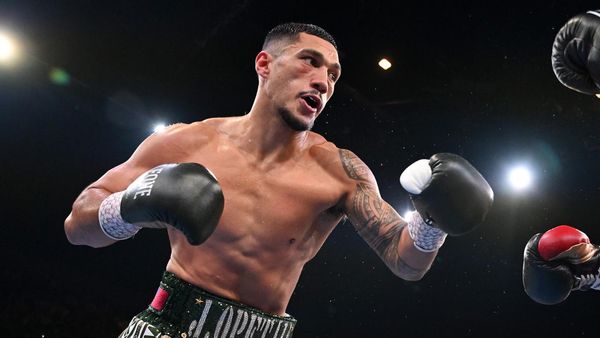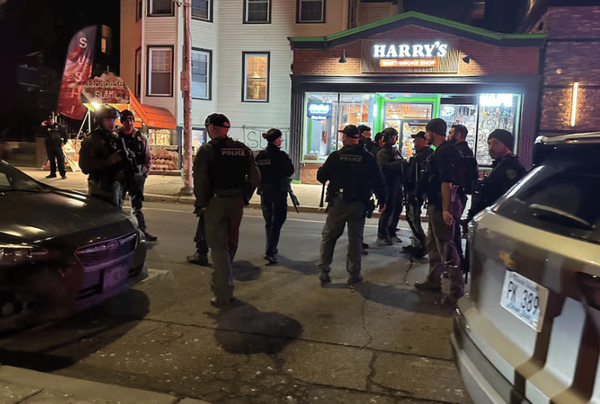
For teenager Janice Mitchell, hearing the Beatles’ I Want to Hold Your Hand on US radio in December 1963 affected her in ways she still can’t quite articulate. “How do you explain why [you were] electrified when you were struck by lightning?” she says, laughing.
I Want to Hold Your Hand didn’t just sound more interesting than the other songs in rotation on her home town station, the single represented an escape from a difficult childhood. Mitchell, of Cleveland, Ohio, grew up with neglectful parents who eventually abandoned her and two younger siblings. And 1963 had been another hard year. Mitchell was reeling from the death of a beloved great uncle, one of the few adults who had shown her kindness.
The arrival of the Beatles provided a glimmer of hope. “I realised I wanted to go to where the Beatles were from, because I figured that’s where happiness would lie,” Mitchell says. “That was my goal: to go there and breathe Beatles air, walk on sacred Beatles soil and have a happy life.”
Mitchell made good on her wish, as she recounted in her riveting book My Ticket to Ride: How I Ran Away to England to Meet the Beatles and Got Rock and Roll Banned in Cleveland. She and another resourceful friend successfully left the US and spent a blissful three weeks in England in autumn 1964, enjoying London nightlife and the sights and even visiting Liverpool – though, unfortunately, they did not cross paths with any of the Beatles.

My Ticket to Ride is far from the only Beatles book released last year. Most notably, Paul McCartney’s bestselling The Lyrics: 1956 to the Present arrived weeks after The Beatles: Get Back, a companion piece to Peter Jackson’s epic-length documentary. But Mitchell’s memoir is one of the few Beatles books written by a woman in the 60 years since they released their debut single. The Beatles have profoundly shaped and enriched the lives of women, but the literature, journalism and critical scholarship – with a few notable exceptions – tends to focus disproportionately on how men experience and appreciate the band and its music.
“For a generation X woman coming up in the 1990s, the odds of placing a Beatles-related story or interview at a major publication felt like 100-1,” says music journalist Kristi York Wooten. Yet in recent years more scholars, journalists, musicians and podcasters are challenging conventional Beatles narratives and expanding who gets to lead conversations around the band. To Wooten, this shift is long overdue. “Media coverage of the band’s evolution has depicted women as bystanders, rendering our stories of the music’s impact inferior or merely tied to fandom.”
Ardent Beatles fandom isn’t always viewed in a positive light, despite how vital it was to the band’s success. As critic Sasha Geffen writes in Glitter Up the Dark: How Pop Music Broke the Binary: “Without Beatles girls, there’s no Beatles. Each group forged its identity in relation to the other.” Yet the narrow stereotype of a Beatles fan that crystallised during the 1960s – think a teenage girl screaming over the band because they’re so cute – lingers.
“Female scholars who are also fans of the Beatles still run the risk of being perceived as more of a fan than as an authoritative voice,” says Dr Christine Feldman-Barrett, a senior lecturer in sociology at Griffith University and author of last year’s A Women’s History of the Beatles. “The legacy of the ‘hysterical’ female Beatles fan is such that it has, I believe, made a good amount of women reluctant to write about the Beatles until more recently.”
Feldman-Barrett’s book is a comprehensive corrective to outdated modes of thinking. It delves into lesser-covered topics ripe for analysis (such as how the Beatles influenced female musicians) and takes a fresh look at Beatlemania, the women of the Beatles’ universe and fan relationships with the band.
The book grew out of Feldman-Barrett’s lifelong appreciation for a band that opened her eyes to other subjects, such as “British history, the interest in eastern spirituality in the 1960s”, she says. “It’s really been a portal into different interests.” As Geffen writes: “A girl could invest her desire in the band, but she could also discover herself there.”
Decades later, the Beatles’ ability to spark curiosity persists across generations. Growing up in the UK, musician and author Stephanie Phillips was struck by the Beatles’ cultural omnipresence. “As a young person who wanted to develop my own sense of self, it almost felt overwhelming,” she says. Coming to the band’s music in her 20s via noisier covers by American bands such as Pixies and Throwing Muses “gave the Beatles this alternative sheen and almost made them sound like an obscure underground cult band,” she says.

Such sonic leeway shaped the music Phillips makes in the punk band Big Joanie – she references both the White Album’s “experimental song structures” and the taut songcraft of the Beatles’ “earlier, pop-centric albums” – and helped her cement a different perception of the band. “My version of the Beatles wrote short and snappy love songs, experimented with every genre possible and was clear about the cultures they were influenced by,” she says. “It is in my mind a more expansive and inclusive version of the Beatles than the band that I grew up hearing on the TV as a kid.”
Dr Holly Tessler vividly recalls hearing news reports on John Lennon’s 1980 murder, although she didn’t know who the musician was at the time. “Being the dorky kid I was, rather than listening to the music, I decided it was going to be a research project,” she says. The 10-year-old borrowed Nicholas Schaffner’s The Boys from Liverpool from the library and spent the next few weeks reading (and re-reading) the book, “boring all of my friends and family” by peppering them with Beatles facts. “After what must have been an interminable amount of time, my parents just said: ‘Here, kid, listen to music.’ And there was no going back.”
Tessler’s subsequent insatiable interest in all aspects of the Beatles led her into academia and founding the University of Liverpool masters programme The Beatles: Music Industry and Heritage. Launched in September 2021, it offers a rigorous study of the band’s cultural, media and economic impact. Tessler says the class is diverse, spanning new graduates to mature students in their 60s. “I was a little bit concerned that there would be a big division,” she says. “They’ve all sort of bonded now. And everybody’s a happy little group of Beatles students together.”
The younger generations of Beatles fans who came to the band long after their breakup are even less beholden to rigid historical narratives surrounding the group, says Tessler. “[They’re] much more plugged into debates around gender and sexualities than earlier generations would have been.”
It’s a conversation that has been broadened by the podcast world. “I see more young fans wanting to move away from the ‘who do we blame for the breakup’ approach, and more towards an approach that analyses everyone’s individual experiences, emotions, and points of view,” says Thalia Reynolds, who co-hosts Another Kind of Mind: A Different Kind of Beatles Podcast with Daphne Mitchell and Phoebe Lorde. The show operates as a collective of voices presenting thoroughly researched episodes (sample: “Jealous Guy: Lennon-McCartney and Competitive Admiration”). “We thought it was past time the Beatles were discussed with empathy and humanity,” says Lorde. “That means making the effort to see things from every perspective.”

The podcast’s co-hosts say the Beatles have shaped their lives in numerous ways: influencing them to perform, write and develop an appreciation for music; deepen friendships; and even find solace in discussions about topics such as John Lennon’s sexuality. “The Beatles’ music, their story, their selves are uniquely comforting,” says Mitchell.
It isn’t necessarily a given that multiple generations of Beatles fans will get along. Allison Boron grew up a fan of the Monkees and Beatles. As a teenager, she eventually found kindred spirits in the latter’s nascent, circa-Y2K online community. “I can’t imagine who I would be without the Beatles,” she says. “It sounds crazy sometimes when I hear myself say that, but there’s really no way they haven’t impacted my life.” One early job working for a local Beatles tribute band piqued her interest in the music industry, where she works today.
In 2018, she launched the podcast BC the Beatles. Boron recalls how she and co-host Erika White received plenty of encouragement from older fans. But they also experienced ageism, sexism and fandom gatekeeping. “We were bumping up against people who didn’t think we had a place at the table because we weren’t there originally,” she says. “We were having a hard time getting taken seriously.”
Empathy for the unfairly maligned Yoko Ono inspired the launch of All About the Girl, a Liverpool-based podcast. “All my life I had heard all sorts about her, that she was some kind of talentless destructive force, or a joke,” says co-host Chloe Walls. “Only when I started to do my own research did I grasp the total disservice done to her by the mainstream narrative.” Walls came to love Ono’s music while researching the Beatles after seeing the 2019 movie Yesterday; she was “irritated” by how the film “fundamentally misunderstood what made the Beatles great.”
Several podcasters interviewed mentioned Beatles fan fiction and fan art as an influence on their fandom – and especially that of younger generations. For Walls, the Beatles’ online fandom was also formative in that it “allowed me to be creative in a space with other likeminded people” and also introduced her to her partner (and podcast co-host) Daisy Cooper. The pair met in 2020 on Tumblr, “in a discussion about the relationship between John and Paul,” Walls says.
As an adult, My Ticket to Ride author Mitchell worked as a journalist and a private investigator. While writing her book, she used those skills to try to figure out aspects of her painful childhood. She discovered greater empathy for her younger self – as well as perspective on how hearing I Want to Hold Your Hand altered the trajectory of her life. “If I had never heard the Beatles at that time, my life would have been completely different.”
• My Ticket to Ride: How I Ran Away to England to Meet the Beatles and Got Rock and Roll Banned in Cleveland by Janice Mitchell is published by Gray & Company.







